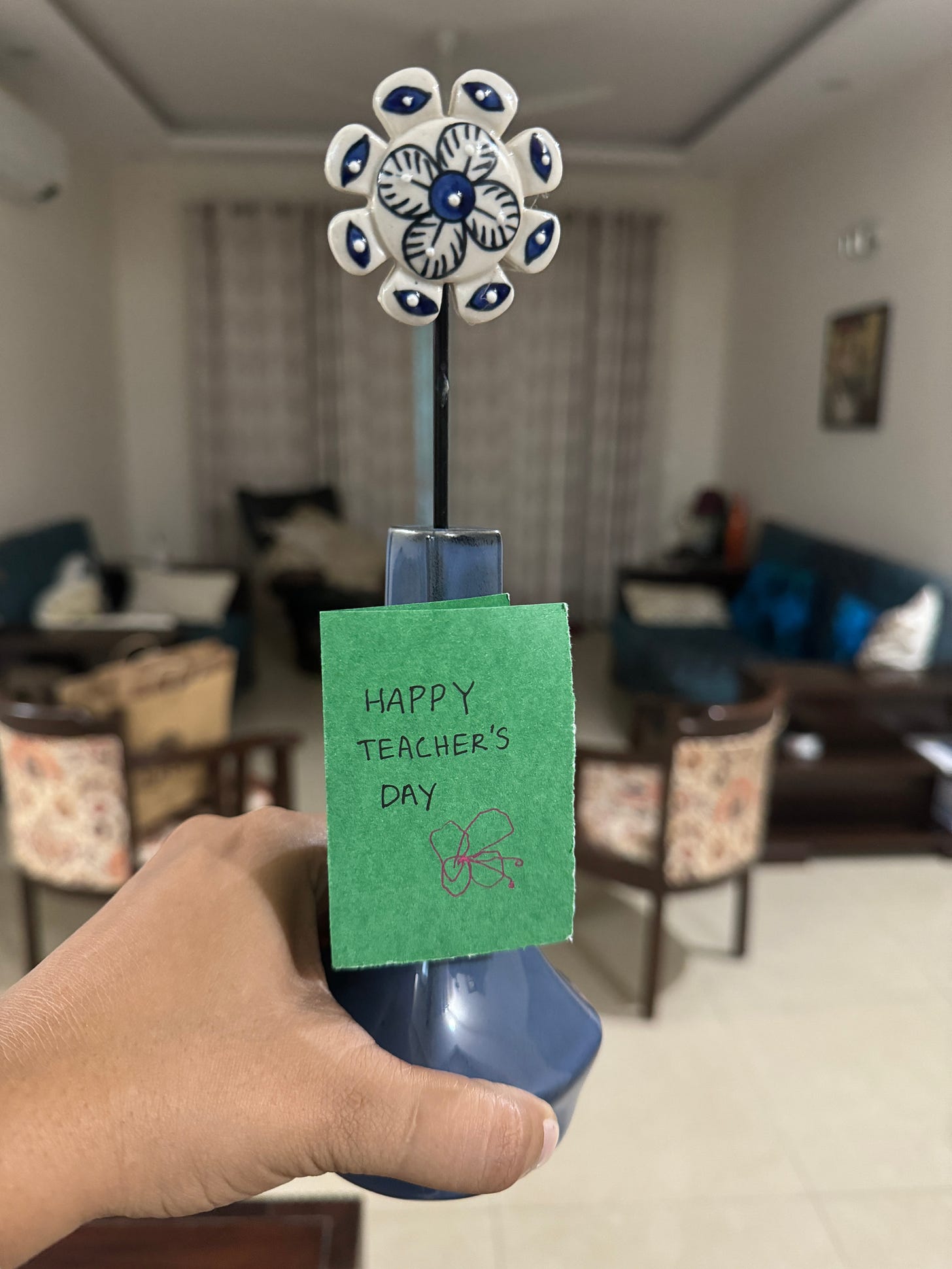I could write a thousand words about how my teachers and mentors have shaped me, and someday I will. But this morning, this beautiful gift on my dining table urged me to write about the privilege and honour of being on the other side.
Last week, my students surprised me with this ‘Teacher’s Day’ gift. In India, September 5th is dedicated to honouring gurus and teachers, a tradition unbroken since the country’s second President, Dr Radhakrishnan, started it in 1962.
Seeing the tiny vase and ceramic flower this morning - and thinking about the sweet and simple moment of receiving it - reminded me that my ability to teach is but a reflection of the energies and attitudes my students bring to the classroom. When I tune into those energies, interesting things can happen. Let me explain.
Teaching is not my full-time profession, but I love doing it intermittently. Teaching is gratifying in and of itself, but, as all teachers will recognise, preparing for class can be a valuable reflexive exercise for other non-teaching facets of our work. When I teach, I find I can synthesise in unique ways knowledge from twenty years of practice and research in the broad realm of the ‘urban’. For instance, I’ve spoken to students about my housing work in contexts as diverse as social inclusion, policy, urban planning, and so much more. I also learn a lot from students who are generous enough to bring their authentic selves into the classroom and foster open dialogue that is mutually enriching. I wrote about some aspects of this last year.
But these are only meant to be side effects. I am keenly aware that I should be focused on what students get from me. I have generally taken a traditional approach, focusing on delivering content and generating debate and analysis through prepared lectures, guided conversations, class exercises and home assignments. And, where possible, plenty of fieldwork! In the first few sessions of every teaching assignment, I assess my classroom and find roughly three categories of students: those who are inquisitive and eager to share, those who say less but think deeply, and the floaters who absorb what they can while going through the motions of being part of the class. Since I am a guest faculty member, I am lucky not to encounter many disinterested students.
My current cohort of students, too, has this typical mix. Many are shy and not used to speaking up in class, so I have relied on tactics like speed writing and drawing that I learned from my writing mentors to get them all to participate. These have worked like a charm. The students and I have discovered originality, humour and poetry by writing, reading and drawing together. We have bridged the boundaries between the real and the imagined, the grand and the quotidian, and the present, past and future. (A quick hat tip here to
, , and , whose workshops have inspired not just my writing, but my teaching practice, too!)The Teacher’s Day gift I held in my hand was also spanning a boundary, by delivering an important message. Inside the tiny card taped onto the miniature vase, students had hand-written a witty message:
“Handle us with care!”
The message both tickled me and gave me pause. It might have been meant as a joke, but says volumes about how youth re-imagine the role of teachers and mentors. We are here to guide and offer pathways into knowledge, rationality, and critical thinking. We are not here to judge, demean, criticise or do anything that strips our students of their dignity and self-worth.
It was not planned, but on Teacher’s Day, recognising that students struggled with completing readings before class, I deviated from the script and talked about essential strategies for lifelong learning. We discussed how we might get through 150-200 pages of reading per week and how simple practices like journalling and sketching could connect disparate thoughts and document self-growth.
As a teacher, I come into the classroom with infinitely more experience, knowledge and skills, but my own learning processes are constantly undergoing experimentation. Where student-teacher relationships are, by definition, founded on unequal knowledge, conversations about individual practices and explorations can offer rare moments of vulnerability, honesty and open-mindedness that fleetingly shift power dynamics and allow everyone to feel seen and heard. When the status quo re-asserts itself, as it must, I hope that these shared moments lay the foundation for trust, collaboration and curiosity in the classroom.





So beautifully expressed, Mukta. Loved how you have shared about teaching and learning from each other, and engaging different types of students 🌸💖
Hi Mukta, thank you for this reflective piece. Your students are lucky to have you teaching them.